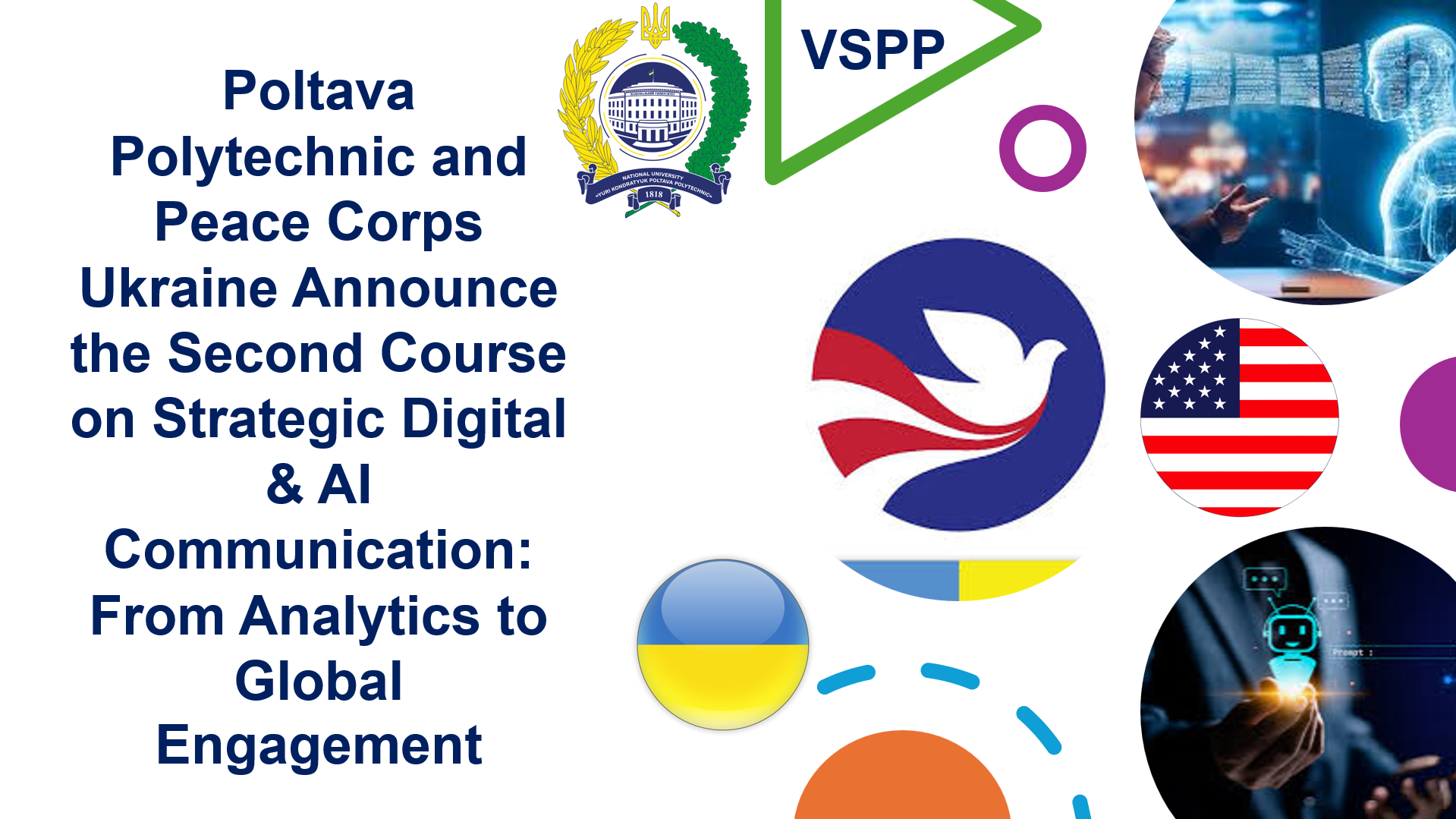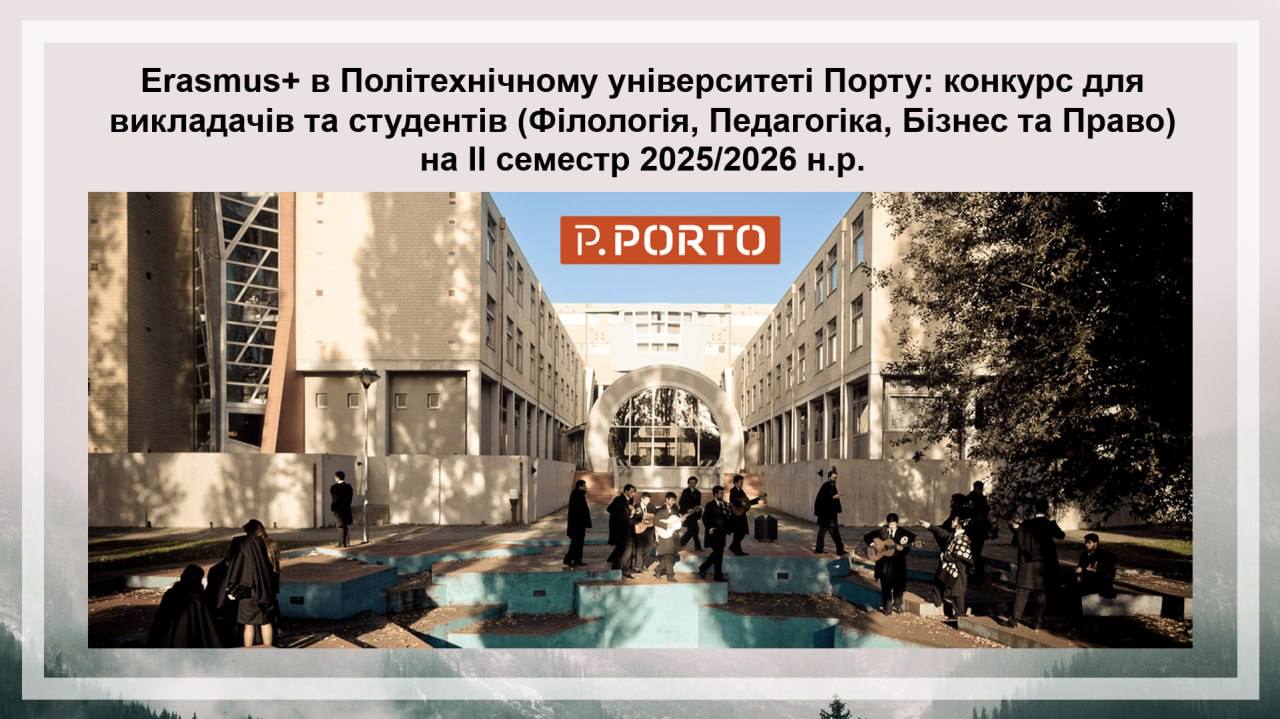Studying abroad opens up countless possibilities – from familiarising oneself with a new country and a different educational culture to broadening one's worldview and communicating with people from all over the world. Sofiia Udovytska, a student in group 301 ET specialising in “Tourism and Recreation” at the National University “Yuri Kondratyuk Poltava Polytechnic”, is currently taking advantage of this unique opportunity. She shared her first vivid impressions of her stay at the University of Applied Sciences Burgenland (Hochschule Burgenland) in Eisenstadt, Austria, during the Autumn Semester of the 2025/2026 academic year (September 1, 2025 – January 30, 2026).
Sofiia gladly speaks about her experience, noting that these two months in Austria have been a genuine revelation for her:
“Studying abroad is not just an opportunity to visit a new country; it’s a chance to experience a different educational culture, meet people from all over the world, and expand my own horizons. I have already been studying for 2 months under the Erasmus+ credit academic mobility program at the University of Applied Sciences Burgenland (Hochschule Burgenland) in Eisenstadt, Austria.
The educational process here truly stands out for its dynamism and depth. Instead of a traditional approach, the focus is on active practice and the synergy of teamwork, realised through numerous joint projects and assignments. The atmosphere fosters the free expression of opinions, lively discussions, and the generation of innovative ideas. Lectures transform into interactive dialogues, where professors do not simply transmit knowledge but invite co-creation, asking questions and encouraging the exchange of viewpoints.
The electronic learning system, which contains all materials, deadlines, assignments, and grades, is a reliable assistant in planning and organising time. The University creates a truly comfortable environment where every student feels supported and has opportunities for comprehensive development. This approach not only shapes critical thinking, sharpens communication skills, and fosters independence but also turns learning into an exciting journey. It is more than just material assimilation – it is an experience that forges personality and prepares one for the challenges of the real world.
A distinct advantage is the flexible schedule: usually, only 3-4 days a week are dedicated to studying, lasting 3–5 hours, sometimes with the possibility of Saturday classes. However, there are weeks with minimal or no workload, which provide valuable time for relaxation, walks, communication, and travel.
In Austria, I am studying subjects such as Intercultural Team Communication and Outdoor Training, Principles of Economics, Trends in International Sustainable Business, Professional English for Social Work, Business Process Management Theory, and Strategic BPM & Behavioural Strategy. This harmoniously selected set of disciplines lays a strong foundation for economic thinking and managerial expertise, enabling the optimisation of business processes and the development of far-sighted strategies. The program's special emphasis on international sustainability principles is key to ensuring long-term success and prosperity. Thanks to innovative teaching methodologies, these subjects help me develop indispensable skills in intercultural communication and effective teamwork.
Before the semester began, we had a “Welcome Week”, dedicated to getting acquainted with the diverse world of Erasmus students and their cultures. The first day started with an exciting quest around the university, during which we took photos at various locations. My team won and received a nice prize.
Throughout the week, several excursions were organised for us, the first of which was an unforgettable wine tasting. We enjoyed exquisite wines from the local wineries of Burgenland, a region famous for its superb red and white wines. The sommelier expertly shared insights into the subtleties of the production process and the differences between the varieties, deepening our knowledge and taste sensations.
We also had the opportunity to walk through the centre of Eisenstadt with a guide. Our route started near the majestic Esterházy Castle, whose architecture truly captivated me. We walked through cosy streets, immersing ourselves in the atmosphere of this ancient city. I was particularly impressed by Joseph Haydn’s house and the old city church. This walk left an indelible feeling of genuine Austrian charm.
One of the local students prepared a short, handy, and fun guide for us on “How to survive in Austria”, sharing valuable tips on discounts, shops, and other aspects of everyday life. Together with him, we spent an entire day in Vienna, where we saw the main sights, majestic cathedrals, the Imperial Library, the picturesque Stadtpark, and witnessed an unforgettable sunset on the banks of the Danube.
During this period, I had an incredible opportunity to visit several countries and another charming city in Austria, all of which I did with my new friends.
The first destination was the majestic Budapest. We explored the capital of Hungary together, and a special moment etched in my memory was the evening Danube cruise. An incredible view of the city, illuminated by night lights, opened up before us, and the grand Hungarian Parliament building appeared as a true architectural marvel, resembling an elegant lace crown. We visited the Fisherman's Bastion and St. Stephen's Basilica, gaining unforgettable impressions.
The next trip took us to the Czech Republic, to the fairy-tale Prague. I walked across the famous Charles Bridge, visited the ancient Prague Castle, and watched in fascination as the Astronomical Clock moved in the Old Town Square, immersing myself in the city's unique medieval atmosphere. Separately, I was impressed by the “Signal Space” Digital Art Gallery, where I fully immersed myself in the world of digital art, fascinating light, and interactive installations.
And, of course, we did not miss the opportunity to visit the charming Hallstatt in Austria. This tiny lakeside village is remembered for its incredible picturesqueness: houses that seemed to have stepped out of a postcard nestled cosily against the cliffs, and crystal-clear water reflected the majestic mountain peaks. It was the perfect place to enjoy the quiet beauty of nature and find peace after the city's hustle and bustle.
During the recent #ErasmusDays2025, we took an exciting trip to the university's second campus in Pinkafeld. There, we immersed ourselves in a whirlwind of intercultural communication, joining local students to learn about their traditions and participate in several interesting events.
One of the first activities was an exciting “bingo”, where, communicating with each other, we discussed proposed topics and shared the cultural specifics of our countries. For example, we learned about the deep respect Austrians have for punctuality and their custom of always arriving at someone’s home with a gift, and about Asian cultures' preference for less intense eye contact, and so on.
For the second task, we divided into groups, each composed of students from several countries, and explored which human values are important to us personally and to businesses. We delved deeper into the subtleties of intercultural interaction in the workplace, discussing greetings, addressing people, personal space and distance, punctuality, deadlines, and gift-giving traditions, and learning about the norms and taboos of different cultures.
After lively discussions, each group presented their findings, and at the end of the day, the university prepared pleasant souvenirs that served as a wonderful reminder of this eventful day.
Then our journey continued to the majestic Burg Schlaining Castle. From its high walls, a stunning panoramic view of the picturesque forests and hills of Burgenland opens up. Inside, the castle impresses with its atmosphere: ancient stone walls, creaking wooden stairs, and historical halls housing exhibitions on the Middle Ages, peace, and diplomacy. We were told that today the castle functions as the Austrian Peace for Centre Schlaining (Friedenszentrum Schlaining), where exhibitions, conferences, and educational events are held. The excursion left unforgettable impressions, as this is a place where not only the breath of history is felt, but also a powerful idea of harmony and cooperation between people.
I am grateful to the National University “Yuri Kondratyuk Poltava Polytechnic” for this chance to gain a unique experience of studying abroad, learn about a different culture, improve my knowledge, and find inspiration for new achievements”, – says Sofiia Udovytska.










Poltava Polytechnic has been actively cooperating with the University of Applied Sciences Burgenland for more than three years. In the 2023/2024 academic year, Nadiia Kubrak and Anastasiia Arkhypova (Autumn Semester), and Nadiia Kubrak, Anzhelika Didechkina, and Dana Sholokh (Spring Semester) studied in Hochschule Burgenland under the credit academic mobility program. In the 2024/2025 academic year, Bohdana Kurylo, Daria Shurdik, and Maryna Kostenko participated.
In the spring of 2024, two lecturers from Poltava Polytechnic took part in the Erasmus+ academic mobility program at the University of Applied Sciences Burgenland (Eisenstadt, Austria), attending International Staff Week 2024. Two other lecturers – Oksana Vorobiova and Yuliia Nikolaenko – received CEEPUS academic scholarships for teaching from the Austrian Agency for Education and Internationalisation (OeAD) and gave lectures at the Hochschule Burgenland. Yuliia Nikolaenko also participated in the Erasmus+ academic mobility program for lecturers in June 2025 and September 2025.
As a reminder, faculty members of Poltava Polytechnic are eligible to participate in academic mobility and internship programs. Students can study abroad through Erasmus+ credit academic mobility grant programs for a semester or a full academic year at leading universities in Austria, Greenland, Denmark, Estonia, Finland, France, Germany, Greece, Ireland, Italy, Latvia, Lithuania, Luxembourg, the Netherlands, Norway, Poland, Portugal, Romania, Slovakia, Spain, Sweden, and the Czech Republic.
For more detailed information on current internship, teaching, and academic mobility programs abroad, please get in touch with the International Relations Office (office 213-C, interoffice@nupp.edu.ua) or the coordinator of international activities at the National University “Yuri Kondratyuk Poltava Polytechnic” – Anna Pavelieva, Ph.D. in Philology, Associate Professor of the Department of Germanic Philology and Translation (email: kunsite.zi@gmail.com, phone: +38-(095)-91-08-192).
Media Centre of
National University “Yuri Kondratyuk Poltava Polytechnic”



